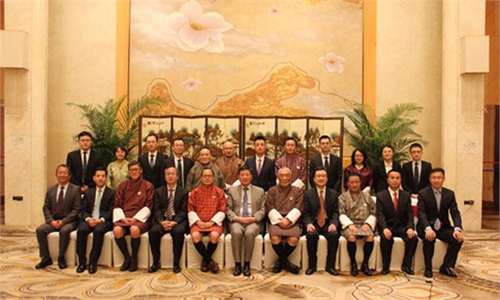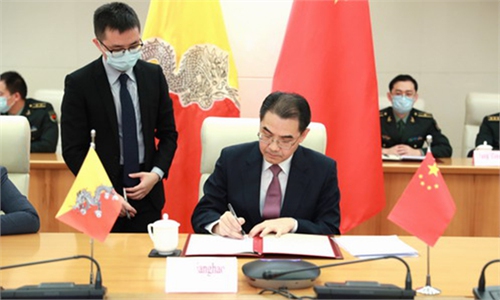MoU on China-Bhutan boundary talks 'breaks deadlock caused by India, paves way for diplomatic ties'
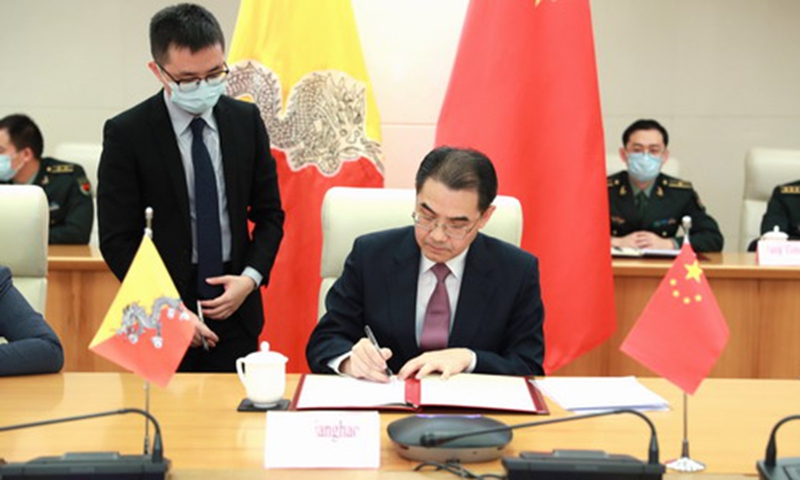
Photo:Ministry of Foreign Affairs of China
China and Bhutan signed a Memorandum of Understanding (MoU) on a Three-Step Roadmap to help speed up boundary talks that have been heavily delayed, during a virtual meeting held on Thursday. The MoU is of historic significance and is the result of years of joint efforts and sincere cooperation between the two sides, analysts said, noting that it points out the direction for breaking the current deadlock and laying a foundation for the establishment of diplomatic relations between China and Bhutan.
Unlike what it did in the Doklam standoff in 2017, India may have less chances or excuses to make troubles over border areas when there is significant improvement on boundary talks between China and Bhutan, and it may choose to set blockades for Bhutan and China when the negotiations enter the crucial period, experts warned.
The Assistant Minister of Foreign Affairs of China, Wu Jianghao, and the Foreign Minister of Bhutan, Lyonpo Tandi Dorji, signed the MoU on the Three-Step Roadmap for Expediting the Bhutan-China Boundary Negotiations at the virtual signing ceremony.
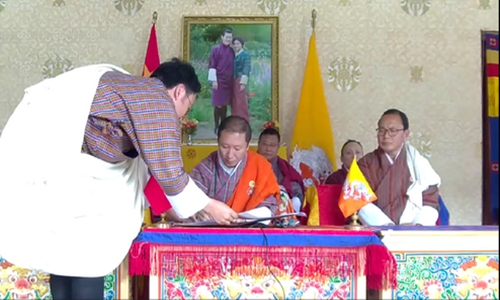
Photo:Ministry of Foreign Affairs of China
Wu said the traditional friendship between the two peoples goes back to ancient times. It is expected that the MoU will make a meaningful contribution to speed up the negotiation on demarcation and promote the process of establishing diplomatic ties between the two countries, Xinhua News Agency reported.
Foreign Minister of Bhutan, Lyonpo Tandi Dorji said that Bhutan will work with China to implement the MoU, unswervingly push forward the negotiation on demarcation and be committed to strengthening bilateral relations, Xinhua reported.
Chinese experts reached by the Global Times hailed the inking of the MoU, saying that negotiations on boundary issues between China and Bhutan started in 1984 and previously had no breakthroughs after more than 20 rounds of talks. The MoU is a milestone and would help break the deadlock.
Bhutan is one of two countries that have land boundary issues unsolved with China, but signing the MoU is significant as it represents a big step forward for the two countries in solving the issues, Wang Shida, deputy director of the South Asia, Southeast Asia and Oceania Research Institute of Contemporary International Relations Research Academy of China, told the Global Times.
The boundary issue between China and Bhutan is special because it not only relates to Bhutan but also has become a negative factor for China-India ties. Unsolved China-Bhutan boundary issues were used as an excuse by India to attack China during the Doklam standoff in 2017. If China and Bhutan make progress in solving boundary disputes, India will have fewer chances and excuses to make troubles on border areas, said Wang Shida.
On June 18, 2017, Indian border troops crossed the China-India boundary in the Sikkim sector and advanced more than 100 meters into Chinese territory. Indian troops' illegal crossing of a delimited boundary and entering the territory of China violated China's sovereignty and territorial integrity, but India has invented various excuses to justify its illegal action, including claiming to protect Bhutan from China.
According to a list of facts released by the Xinhua News Agency, the 1890 Convention has made it clear that the China-India boundary in the Sikkim sector commences at Mount Ji Mu Ma Zhen on the Bhutan frontier. Mount Ji Mu Ma Zhen is the eastern starting point of the China-India boundary in the Sikkim sector and it is also the boundary tri-junction between China, India and Bhutan.
The Indian troops' trespassing occurred at a place on the China-India boundary in the Sikkim sector, more than 2,000 meters away from Mount Ji Mu Ma Zhen. Matters concerning the boundary tri-junction have nothing to do with this incident. There is no dispute in this section of border.
As Chinese experts hail the MoU on a roadmap between China and Bhutan, India has also paid close attention to it, because it has long stood in the way of China and Bhutan's negotiations on boundary negotiations by wielding influence on Bhutan's defense and diplomacy.
In response to whether India has been informed by Bhutan about the MoU, the spokesperson of Indian's Ministry of External Affairs Arindam Bagchi said that India noted the MoU, the Times of India reported on Friday. It also noted that it is inconceivable that Bhutan would not have discussed the MoU with India.
Some Indian media said that India's "cautious response" was "understandable" due to its fraught relations with China over border disputes.
India has always been the reason for the delay in negotiations on boundary issues between China and Bhutan. After previous rounds of talks, the two sides have reached a consensus on some issues, but India believes these would undermine its interests, especially about the western section of the China-Bhutan border, which India thinks could pose a threat to the Siliguri Corridor, Wang Se, an assistant professor at the Institute of South Asian Studies of the China Institute of Contemporary International Relations, told the Global Times.
When India puts pressure on Bhutan, it makes it difficult for China and Bhutan to push for border negotiations. After the Doklam standoff, China and Bhutan did not hold a meeting for border talks for a long time, which shows India was exerting great influence on Bhutan, Wang Se noted.
So far, no details of the three-step roadmap have been revealed. Wang Se said the roadmap might be similar to the principle of China-India border talks, which means they will first establish basic political principles of boundary demarcation, then solve specific disputes and finally, sign an agreement and draw the boundary demarcation.
Experts noted that India will interfere when the roadmap is implemented to make concrete protocols. "Signing the MoU is not as sensitive as signing a concrete agreement. It is highly possible that India would exert great pressure to Bhutan when Bhutan's negotiations with China are at a crucial point to prevent its final success, or India may mess up the negotiations," Wang Shida said.
Experts warned that there may be changes over the negotiations between China and Bhutan due to India's possible interference.
The timing of the MoU also raised concerns from some Indian media as it comes at a time when the India-China border talks on their 17-month-old standoff at the Line of Actual Control appear to have hit an impasse this week. The Chinese People's Liberation Army (PLA) Western Theater Command issued a statement on Monday, slamming India for its unreasonable and unrealistic demands and the new incidents the latter sparked along the eastern section of the border recently.
An expert who asked for anonymity told the Global Times that signing the MoU shows Bhutan's sincerity in solving problems with China and its willingness to get rid of India's interference to gain more independence of diplomacy for Bhutan's own national interests.
Given India frequently makes troubles in the border areas, China also wants to take the initiative along border areas by promoting boundary talks with Bhutan as well as solving China-India border disputes, the expert said.
Due to geographic and historical reasons, India has great influence over Bhutan's diplomatic policies and internal affairs. The Global Times reporters went to visit Bhutan during the Doklam standoff in 2017 and saw India's influence in the country in every field.
For example, in Haa, a place of great strategic and military importance in west Bhutan, the India army has dominated. Residents have complicated feelings over India as although they want to have a powerful neighbor like India but they also fear about India's stirring up of confrontations with China, which may drag Bhutan into the abyss. Some educated individuals think that India is lying by saying "protecting" Bhutan.
Wang Shida said that India has shored up its influence along the Himalayas and neighboring countries, especially to Bhutan. Land-locked Bhutan relies heavily on India to import oil, food and other basic necessities, which means India is able to interfere in Bhutan's internal and external policies.
But some experts pointed out that with the rising of China, Bhutan has an increasing drive to improve relations and form diplomatic ties with China.
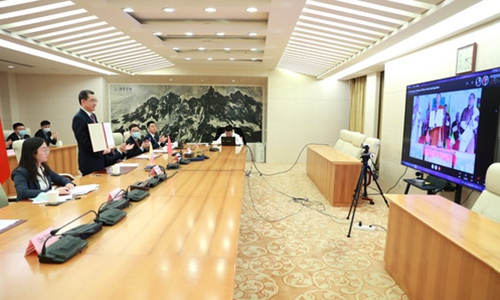
Photo:Ministry of Foreign Affairs of China
Mutual benefits
The MoU also shows China's sincerity in resolving boundary issues with its neighbors through peaceful consultations, which is in contrast with the false accusations made by some Indian media that China is engaging in expansionism and bullying its neighbors, Qian Feng, director of the research department at the National Strategy Institute at Tsinghua University, told the Global Times.
China's ways of solving boundary issues also pose a sharp comparison to India, which is still having disputes with many of its neighbors, including China, Pakistan and Nepal, experts noted.
Zhang Yongpan, a research fellow of the Institute of Chinese Borderland Studies of the Chinese Academy of Social Sciences, said India should take note from the China-Bhutan MoU as India has repeatedly undermined peace and tranquility in the border areas between China and India, violated the agreement and undermined the development achievements of China-India relations over the years.
A field investigation into the China-Bhutan border areas shows herdsmen and farmers on both sides enjoy a peaceful and stable living environment. The roadmap could be beneficial for the China-proposed Belt and Road Initiative and development of China's border regions.
Experts also believe the landmark agreement will push for the establishment of diplomatic relations in China and Bhutan.
Since 1985, Bhutan has begun to establish diplomatic relations with many countries and maintained trade relations with China. Since China's boycott of the Dalai clique in the Himalayan region, Bhutan also made a firm attitude to support China. Therefore, the Tibetan exile has a small impact on the country, Zhang said.
However, due to interference by the Indian government, there are many difficulties for Bhutan on the road of establishing diplomatic relations between China. In a certain sense, the three-step negotiation on the boundary issue could be an important foundation for diplomatic relations between the two sides, Zhang said.


